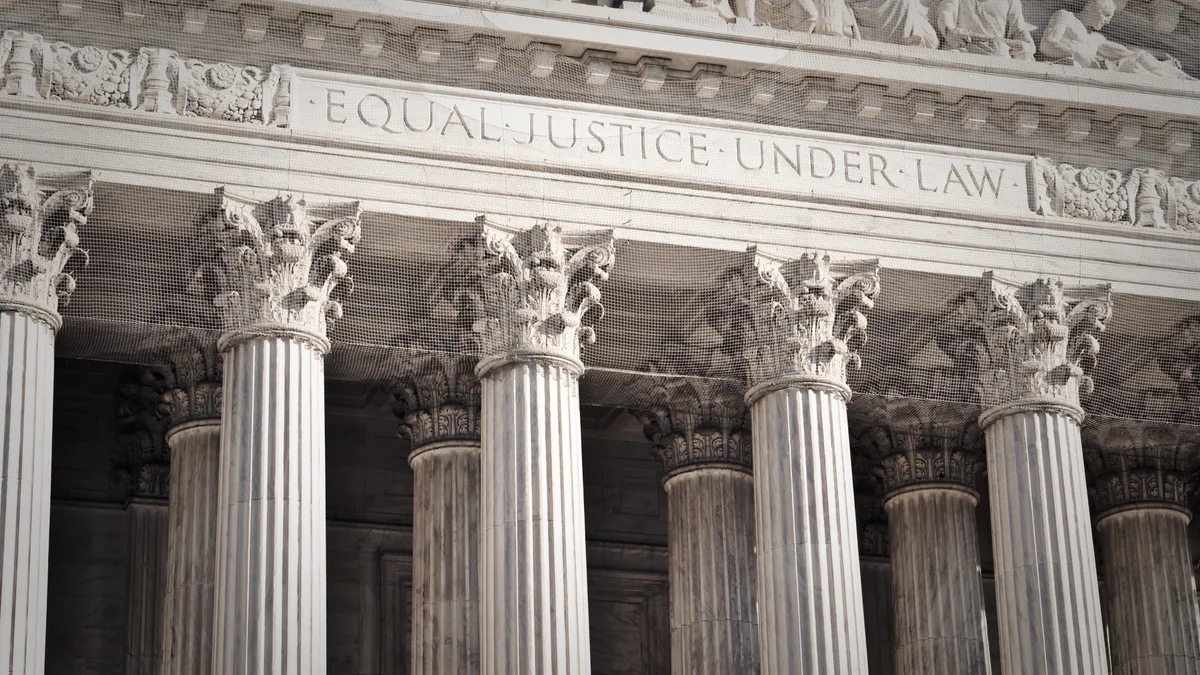UPDATE: June 27, 2019: The U.S. Supreme Court this week upheld a legal doctrine that gives federal agencies the power to interpret their own rules if they are deemed ambiguous.
The Auer deference "retains an important role in construing agency regulations," Justice Elena Kagan wrote in the court's majority opinion. Writing in agreement, Chief Justice John Roberts said agencies' interpretation of their rules must be reasonable and reflect their "authoritative, expertise-based, and fair and considered judgment."
Dive Brief:
- In December, the Supreme Court agreed to review the Auer deference, The National Law Journal reported. The doctrine stems from a 1997 decision directing courts to enforce a regulation as it is written if its meaning is clear and to defer to the relevant federal agency if it is ambiguous.
- The Auer deference has long been a target of conservatives, who argue federal agencies use it to deliberately write vague regulations that they can then interpret however they want.
- The justices' review comes as the U.S. Department of Education moves to overhaul several regulations, including those that govern Title IX, accreditation and online learning. It could impact how much say the agency has over how the final regulations are carried out.
Dive Insight:
The Supreme Court looked poised to overturn the deference with the recent addition of Justice Brett Kavanaugh, who previously predicted the Auer deference is on its way out. "Formally rejecting Auer would have been a more direct approach," he wrote in a concurring opinion. However, he noted that the justices' guidelines on how government agencies can interpret their rules "should lead in most cases to the same general destination."
An overturn of the Auer deference could have had significant implications for how colleges handle sexual misconduct. Education Secretary Betsy DeVos proposed new Title IX rules in November that would grant more rights to the accused, narrow the types of cases colleges will be responsible for investigating, and limit the purview of Title IX offices to harassment that occurs on campus or within a college's program or activity.
Although DeVos has touted the proposed rules' clarity, some Title IX and legal experts have pointed to elements that appear unclear in what they require of colleges. For example, what level of misconduct will trigger the grievance process and how Title IX offices are expected to deal with harassment that occurs online.
Meanwhile, the U.S. Department of Health and Human Services has moved to no longer protect gender identity under sex discrimination laws, which would effectively erase federal recognition of transgender individuals and the key protections that come with it. A ruling on the Auer deference could end up having an effect on those forthcoming regulations and the larger battle for transgender rights.
Since President Donald Trump took office, the Auer deference has had a significant impact on court cases that concern transgender students' rights in education.
In 2017, for example, the Supreme Court was slated to take up its first lawsuit directly regarding transgender civil rights after Gavin Grimm, a transgender teen, sued the Gloucester County (Virginia) School Board over a policy that didn't allow him to use bathrooms that align with his gender identity.
A federal appeals court ruled in favor of Grimm in 2016, deferring through Auer to the Obama-era Ed Department's interpretation of Title IX guidance that stated it was sex discrimination to bar transgender students from accessing the bathrooms that corresponded with their gender identity. The Supreme Court scheduled to hear the case in 2017, but then dropped it when the Trump administration repealed the guidance the appeals court cited, The New York Times reported. The justices also sent the case back to a lower court to review it again in light of the rescinded guidance. A district court ruled in Grimm's favor in May 2018.
However, legal experts say issues over transgender rights could soon land at the steps of the Supreme Court. Grimm's case is just one several similar lawsuits that have been working their way through the courts, PBS reported last year.















